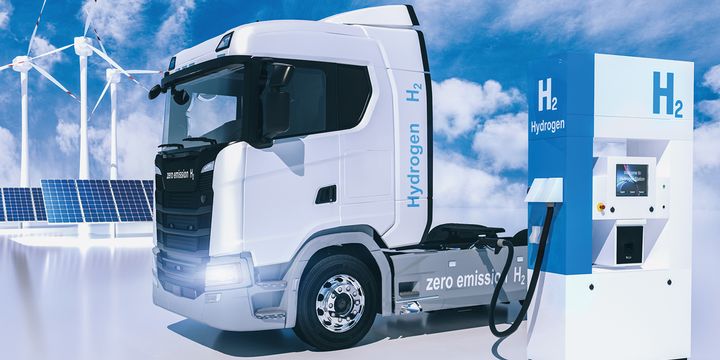Photo: Gettyimages.com/audioundwerbung
Because a total “ecosystem” is needed for the widespread adoption of fuel-cell-powered heavy trucks, companies are working together to accelerate the needed technologies.
Companies around the globe are forming consortiums and other group projects to help advance fuel-cell technology for heavy-duty applications.
In the European Union, the European Fuel Cells and Hydrogen Joint Undertaking (FCH 2 JU) is funding two consortium projects.
The StasHH consortium of 25 organizations in the hydrogen sector will define, develop and test the first European standard for fuel cell modules for heavy-duty applications. It is made up of 11 fuel cell module suppliers, nine original equipment manufacturers, and five research, test, engineering and/or knowledge institutes.
They plan to work together to standardize physical dimensions, flow and digital interfaces, test protocols and safety requirements of fuel cell modules that can be stacked and integrated into heavy-duty applications such as buses, trucks, trains, ships, and construction equipment.
Another consortium funded under FCH 2 JU is called Immortal. The three-year project will develop new materials for fuel cell components specific to heavy-duty truck applications. The goal is to develop higher-performance fuel cell components for heavy-duty trucks with a predicted lifetime of at least 30,000 hours.
The four large industrial partners are major stakeholders in Europe’s fuel cell supply, OEM and end user chain, including makers of the membrane electrode assembly (MEA, the core component of a fuel cell that helps produce the electrochemical reaction needed to separate electrons), fuel-cell stack and system makers, and use of the fuel cell powertrains in heavy-duty long-haul trucks.
Hydrogen fuel cell and vehicle maker Hyzon Motors has founded the Hyzon Zero Carbon Alliance, which aims “to create hydrogen ecosystems in parallel with vehicle deployments” globally. By aligning the supply and demand side of the sector, the alliance is designed to overcome some of the biggest hurdles faced by the hydrogen industry to date, making zero-emission fleet operations a reality in the very near term.
To be established as a nonprofit membership-based entity, the Alliance will specifically identify and target opportunities across priority regions worldwide based on customer demand. Hyzon, headquartered in Rochester, New York, has operations in Europe, Singapore, Australia and China.
In Japan, a group of companies established the Japan Hydrogen Association (JH2A), an association dedicated to the promotion of a global hydrogen-based eco-system. Among the Japanese companies that have joined the organization as founding members are shipping companies, vehicle manufacturers, energy companies, a financial group, and others.
JH2A aims to promote collaboration in the development of new technologies and standards for hydrogen, establish a strong supply-chain and lobby for favorable government policies.
New Briefs from Around the World
In Japan, Isuzu Motors, Hino Motors, and Toyota Motor Corp. have agreed on a new partnership in commercial vehicles to work on Toyota’s CASE technologies: connected vehicles, autonomous/automated driving, shared, and electric. They plan to jointly work on the development of battery electric vehicles and fuel cell electric vehicles, autonomous driving technologies, and electronic platforms for small commercial trucks.
Swedish truck maker Scania (part of Traton) will start building heavy commercial vehicles in China in early 2022 after the recent acquisition of Chinese truck maker Nantong Gaokai Auto Manufacturing. This may be the first time a foreign truck OEM has acquired more than 50% of a Chinese truck builder, following the announcement of reforms to China’s foreign ownership restrictions.
Fuel cell truck manufacturing startup Hyzon Motors of Rochester, New York, has been selected by green hydrogen generator Hiringa Energy of New Zealand to supply hydrogen fuel cell-powered trucks. To be assembled at Hyzon’s European facility in The Netherlands, the first trucks are expected to enter service in New Zealand by the end of 2021.
Daimler Trucks North America named Marcela Barreiro president and CEO of Daimler Trucks Mexico. Barreiro is a 13-year veteran of Daimler Trucks Mexico, most recently as head of human resources. She is the first woman to run Daimler Trucks Mexico and is a strong proponent of diversity, equity and inclusion.
Autonomous-tech developer Plus is partnering with Italian truck-maker Iveco to jointly develop autonomous trucks that will be deployed across Europe, China, and other areas.
DHL Express plans to have more than 14,000 electric vans in operation in Europe by 2030. It recently purchased the first 100 units of Fiat’s new E-Ducato electric van.
SKF is testing a self-driving electric truck with the tech company Einride to transport goods on a public road between the factory and the warehouse in Gothenburg, Sweden.
CUT COTS OF THE FLEET WITH OUR AUDIT PROGRAM
The audit is a key tool to know the overall status and provide the analysis, the assessment, the advice, the suggestions and the actions to take in order to cut costs and increase the efficiency and efficacy of the fleet. We propose the following fleet management audit.




